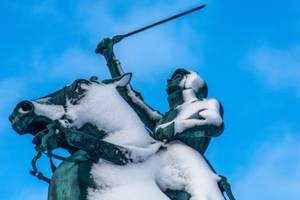This Special Collection focuses on the composition of saints' lives in medieval literature. Alongside allowing their authors to explore and express their faith, the writing of saints' lives provided opportunities to explore subjects such as the foundation myths of religious communities, travel and exploration, and gender and sexuality. Saints' lives were also an ideal medium for reaching a wide variety of audiences. Not only were these texts suitable for consumption in a range of situations ranging from public performance to private contemplative reading, but they also facilitated communication between religious and lay communities, which would not have been possible through other means.
The collection aims to bring the spotlight onto saints' lives as an exciting and innovative narrative medium and a means of communication in the Middle Ages. Articles have been invited to reflect upon the self-fashioning of the religious communities that produced saints' lives, as well as the relationship between audience and narrator constructed in texts in all periods of the Middle Ages and in all medieval literary languages.
Edited by: Katharine Handel (University of York)
Authors, Narratives, and Audiences in Medieval Saints’ Lives
Special Collections
-
Beyond Text: Cross-disciplinary Perspectives on Textuality
Visual Rhetorics of Humour: The Formation and Dissemination of Stereotypes through Cartoons and Memes
Diversity and Competition within the Latin Church: The Secular-Mendicant Controversy and its Long Aftermath (13th–20th Centuries)
Thinking the Political: Theory, Literature, Practice
Poetry Off the Page: Intersecting Practices and Traditions in British Poetry Performance
Humour as a Human Right
Cultural Heritage Data for Research: Opening Museum Collections, Project Data and Digital Images for Research, Query and Discovery
Literature as Imaginary Archive: Ephemera and Modern Literary Production
Caliban's Mirror: Reflections of James Joyce and Oscar Wilde
Cultural Representations of Machine Vision
The Public Curatorship of the Medieval Past
Medieval Minds and Matter
Representing the Medieval in Popular Culture: Remembering the Angevins
The Politics and History of Menstruation: Contextualising the Scottish Campaign to End Period Poverty
Production Archives 03: Archival Practices
Production Archives 02: Production Contexts
Production Archives 01: Puppets for Action
Representing Classical Music in the Twenty-First Century
The Pathological Body: European Literary and Cultural Perspectives in the Age of Modern Medicine
Binary Modernisms: Re/Appropriations of Modernist Art in the Digital Age
Local and Universal in Irish Literature and Culture
Reading in Ruins: Exploring Posthumanist Narrative Studies
The Language of Perspective
Nancy Astor, Public Women and Gendered Political Culture in Interwar Britain
The Working-Class Avant-Garde
Colonialities in Dispute: Discourses on Colonialism and Race in the Spanish State
Powering the Future: Energy Resources in Science Fiction and Fantasy
Writers and Intellectuals on Britain and Europe, 1918–2018
Literature, Law and Psychoanalysis
Muslims in the Media
Encounters between Asian and Western Art in the 20th and 21st centuries: a liberating influence for Asia?
Waste: Disposability, Decay, and Depletion
Pride Revisited: Cinema, Activism and Re-Activation
New Approaches to Late Medieval Court Records
Utopian Art and Literature from Modern India
Right-Wing Populism and Mediated Activism: Creative Responses and Counter-Narratives
Representing Climate: Local to Global
Cultivating Spheres: Agriculture, Technical Communication, and the Publics
Freedom After Neoliberalism
The Medieval Brain
Remaking Collections
New Approaches to Medieval Water Studies
Imaginaries of the Future 01: Bodies and Media
Imaginaries of the Future 02: Politics, Poetics, Place
Imaginaries of the Future 03: Utopia at the Border
Postcolonial Perspectives in Game Studies
Station Eleven and Twenty-First-Century Writing
#Agreement20
What’s Left? Marxism, Literature and Culture in the 21st Century
New Voices in Jewish-American Literature
Authors, Narratives, and Audiences in Medieval Saints’ Lives
From TV To Film
American Literature & the Transnational Marketplace
Mnemosyne
Healing Gods, Heroes and Rituals in the Graeco-Roman World
The Abolition of the University
